国际商务谈判 市场营销 国际经济与贸易 课程课件CHAPTER 5
国际商务谈判:理论、案例分析与实践(第五版)英文版课件Chapter 5

Case Study
Company PolicyW Nhomakorabeao uses positional bargaining?
Who uses principled negotiation?
批注本地保存成功开通会员云端永久保存去开通
Chapter Five
First Component of CPN —Separate People from Problem
•Understand the other party:
•put yourself in their shoes,
•not blame them for your problem; •Control emotion:
Organize a group of four
Two sellers,two buyers
Require -ments
Read background information
Simulation Hotel Selling
Discuss the following with your partner
Second component of CPN
Focus on Interests Not Positions
Position is the attitude or stance of negotiators toward
their interests. Story of two readers
and the librarian
Invent creative options: Separate inventing options from evaluating them, Develop several options before looking for a solution Look for mutual gain: Identify shared interests, Look for options that would make the decision easier for them
《国际商务谈判》第五章
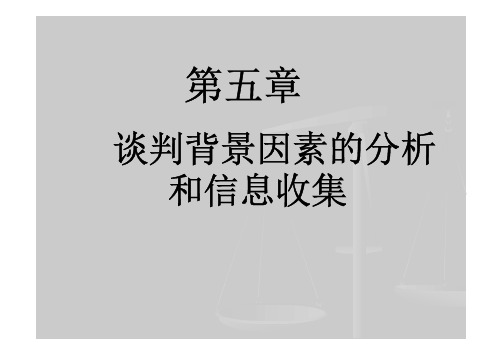
第五章谈判背景因素的分析和信息收集第五章谈判背景因素的分析和信息收集第一节背景因素的分析 第二节谈判信息的收集 第三节谈判双方工作关系的建立【案例导读】2009年,世界初级产品价格则出现了剧烈的波动现象,给处于衰退中的世界经济带来了严峻的挑战。
在初级产品价格大起大落的背景下,中国铝业公司为了稳定国内矿产品原料供给价格,决定加强与国外矿业公司的合作,并购力拓集团。
中国铝业公司(简称中铝)是中国规模最大的氧化铝及原铝运营商,是全球第三大氧化铝生产商,主要产品是氧化铝和原铝。
中国是世界上增长最快的大型铝市场,是世界上第二大原铝消耗国。
力拓集团(简称力拓)成立于1873年,是全球第三大多元化矿产资源公司,全球前三大铁矿石生产商之一,除了铁矿石之外,力拓还涉及铜、铝、能源、钻石、黄金、工业矿物等业务。
2008年下半年,世界金融危机爆发,力拓债务危机爆发,不得不寻求资金支持。
经过谈判,中铝与力拓集团签署战略合作协议,中铝将向力拓注资195亿美元,其中123亿美元将用于参股力拓的铁矿石、铜、铝资产,72亿美元用于认购力拓发行的可转换债权,如果交易完成,中铝将持有力拓18%的股份,并将向力拓董事会派出两名董事。
在此期间,收购案陆续通过了澳大利亚竞争和消费者委员会、德国政府、美国外国投资委员会等权威部门的认可,中铝同时获得国内四家银行提供的210亿美元贷款。
然而,随着形势的变化,力拓财政逐渐好转。
2009年6月,收购案被力拓董事会否决。
而按照双方签署的协议规定,力拓只需向中铝支付1.95亿美元的毁约费。
谈判的失败具有多方面的原因,政治因素、财政金融因素、时机、法律因素等都难以忽略。
从政治因素看,中铝收购力拓,会对国际矿业产生影响,澳大利亚政府对于此项收购小心翼翼。
2009年4月,澳大利亚民意调查结果显示,受调查者中反对中铝增持力拓股份至18%的竟高达59%。
从财政金融因素看,在力拓与中铝签订部分股权转让协议时,正值世界金融危机,力拓债务危机爆发,不得不寻求资金支持,并选择中铝,签下了195亿美元的出让部分股权协议。
国际营销chapter5ppt课件

▪ Culture, including all its elements, profoundly affects management style and overall business systems.
▪ Americans---Individualists ▪ Japanese---Consensus oriented & committed
other countries LO4 The importance of cultural differences in
business ethics LO5 The differences between relationship-oriented
and information-oriented cultures
2. for those new to American culture, it is useful to better understand business associates from the States as the U.S. market is the biggest export market in the world
▪ If it doesn’t, how business executives should respond to local customs ? Give some examples.
▪ The key to adaptation is to remain American but to develop an understanding of and willingness to accommodate the differences that exist
to the group ▪ Central & Southern Europeans--Elitists and
国际商务谈判课件(PPT 82页)
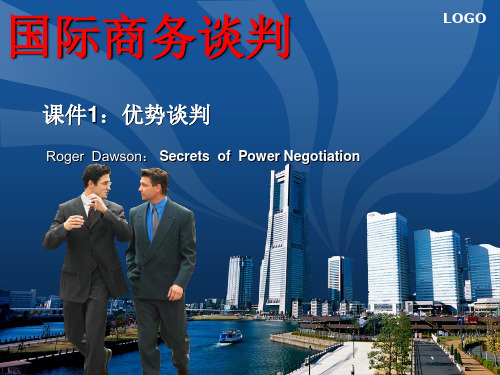
● 第11章 造就优势谈判的驱动力 297
● 1.竞争驱动 298 ● 2.解决驱动299 ● 3.个人驱动300 ● 4.组织驱动 300 ● 5.态度驱动302 ● 6.双赢谈判 303
目录
第一部分 优势谈判 步步为营
一般来说,开局策略通常可以确定 谈判的方向,中场策略则会保证谈判的 方向不发生变化,面当你准备结束谈判 或是结束交易时,你就会用到终局策略 。
3.学会感到意外 19
这样的情况我们几乎每天都会遇到,比如说: ◆你是一名电脑销售员,你的客户问你是否可以延长保修期;
◆你在买一辆汽车,经销商只给你打了几百美元的折扣;
◆你是建筑材料供应商,客户要求你送货上门,却不愿支付任 何送货费用;
◆你在出售自己的房子,客户想在交易结束之前2个星期就搬 进 来。
让我们来看几个简单的例子:
◆汽车经销商报价1.5万美元,你想出价1.3万美 元,这时你第 一次的报价应是1.1万美元。
◆你的一名员工问你她是否可以买一张价值400 美元的办公桌, 你可以接受的条件是325美元 ,这时你应该告诉她你不希望办公桌的价格超 过250美元。
◆你是一名销售人员,买方出价每件1.6美元,你 希望的价格是1.7美元,这时你应该从1.8美元开 始谈起。这样,即便双方最终各让一半,你也 可以达到自己的目的。
1.开出高于预期的条件 4
你对对方的情况了解得越少,刚开始谈判时就应该把条件 抬得越高, 原因有二:
● (1)你的估计可能是错误的。如果你不是很了解自 己的对手,或者并不很了解他的需要,你可能并不 知道他完全有可能接受比你预期更优厚的条件。如 果他是在出售一样东西,他的心理价位可能比你想 象的要低得多。
交谈一番之后,我确定她急于脱手这套公寓,而
国际商务谈判(英文版)Chapter 5 Strategies and Tactics
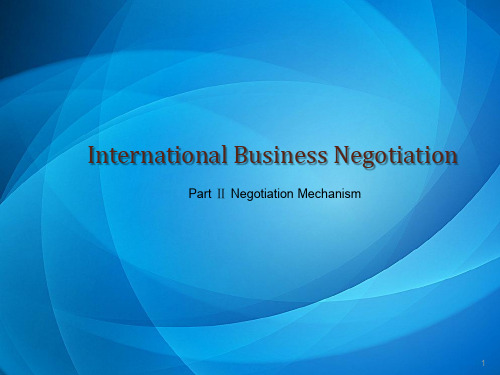
(3) Convincing the other party's supporters to block the other party's operation;
(4) Convincing the other party of the hopelessness of trying to continue on their own.
your offer.9源自②Dependence The most effective and often explored methods to this end are:
(1) Reducing, delaying or withholding services or resources the other party hopes to attain;
7
Factors Causing the Changes of Negotiating Power
Relations of the three factors with the power changes are expressed in the following equation:
P(A~B) = MB×"DB:A" /"SB" -MA×"DA:B" /"SA"
(4) One party has ability to use expert counsel,
persuasion, communication and legal,
historical or moral precedents to gain access to
国际商务谈判课件 ppt

达成协议阶段
总结与确认
在达成协议之前,对已讨论的问 题进行总结,确保双方对协议内
容有明确的了解和共识。
签署协议
根据谈判结果,起草并签署协议, 确保协议的法律效力和可执行性。
后续跟进
在协议签署后,对协议的执行情况 进行跟进,确保双方履行协议内容 。
04
国际商务谈判的策略与技巧
建立信任关系
建立信任关系
国际商务谈判课件
目 录
• 国际商务谈判概述 • 国际商务谈判的核心要素 • 国际商务谈判的流程 • 国际商务谈判的策略与技巧 • 国际商务谈判案例分析
01
国际商务谈判概述
定义与特点
定义
国际商务谈判是指跨越国界的商 务活动中,不同国家或地区的利 益相关者为了达成协议而进行的 交流与协商。
特点
国际商务谈判涉及不同文化、法 律和利益诉求,需要具备高度的 专业知识和跨文化沟通能力。
价值评估
对所涉及的利益进行合理评估,为谈判中的 取舍提供依据。
利益持久性
在达成协议后,确保利益的持久性和稳定性 ,防止未来的冲突和纠纷。
03
国际商务谈判的流程
准备阶段
确定谈判目标
明确谈判的主题、目的和预期结果, 确保谈判方向不偏离。
收集信息
对谈判对手、市场、产品等相关信息 进行收集,以便更好地了解谈判背景 。
05
国际商务谈判案例分析
跨文化冲突解决案例
总结词
展示如何通过理解和尊重文化差异来化解跨文化冲突。
详细描述
一个美国公司和一家日本公司在进行合作谈判时,由于文化差异导致沟通障碍 和误解。通过了解和适应对方的文化习惯,双方最终成功达成协议。
高压环境下的谈判案例
国际商务谈判课件(PPT 50页)【精选文档】PPT
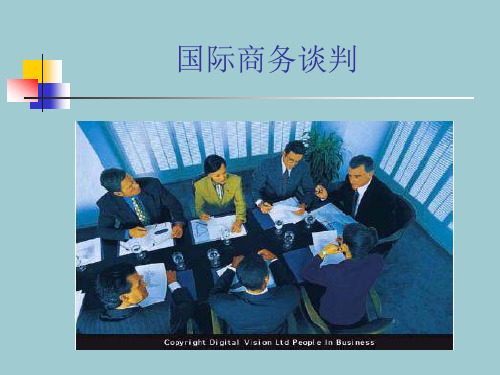
视频播放
闯关东 商务谈判片断
谈判的种类
一.按参加谈判的人数规模划分1.个体谈判 人员必须是全能型,不易得到他人帮助之不足,易决策2.集体谈判。人员互相配合,运用战略,但是需要更多的协调和组织。
十一月 229:35 上午11月-2209:35November 3, 20221.双方谈判(两个利益主体)关系简单,易达成一致 中俄, 日美11月-2209:35:1509:35Nov-2203-Nov-2210、雨中黄叶树,灯下白头人。谈话、谈心、争议、辩论、吵架、口角等,内容应包括:谈判主题与目标的确定;解决方法有很多,如规章制度、管理、执法部门的判决、权威机构的裁决等人才市场上,求职者与用人单位进行双向选择;03 十一月 20229:35:15 上午09:35:1511月-222立场型谈判(或称硬式谈判)A 当年美国总统肯尼迪为前往维也纳同苏联主席赫鲁晓夫举行首次会谈,曾研究了赫鲁晓夫的全部演说和公开声明,以及能够得到的有关赫鲁晓夫的全部资料,甚至连赫鲁晓夫的早餐嗜好和音乐欣赏趣味也不放过。外交谈判—国家利益市场上,买主与卖主为了某项交易而讨价还价;生活中存在各种争议、矛盾、利益冲突,14、意志坚强的人能把世界放在手中像泥块一样任意揉捏。13、乍见翻疑梦,相悲各问年。
三种谈判方法的比较
让步型
立场型
原则型
视对手
为朋友
为敌人
问题的共同解决者
目标
达成协议
赢得胜利
圆满解决问题
手段
对人和事都温和
对人和事都强硬
对人温和对事强硬
立场
轻易改变
坚持不变
重点放在利益上而不是立场
国际商务谈判
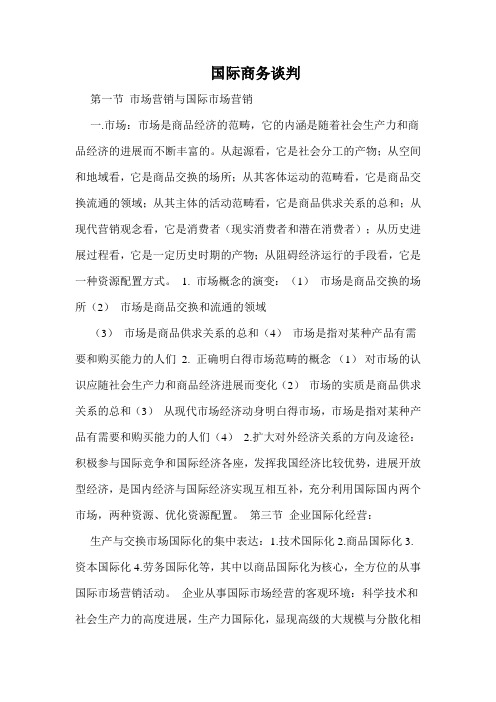
国际商务谈判第一节市场营销与国际市场营销一.市场:市场是商品经济的范畴,它的内涵是随着社会生产力和商品经济的进展而不断丰富的。
从起源看,它是社会分工的产物;从空间和地域看,它是商品交换的场所;从其客体运动的范畴看,它是商品交换流通的领域;从其主体的活动范畴看,它是商品供求关系的总和;从现代营销观念看,它是消费者(现实消费者和潜在消费者);从历史进展过程看,它是一定历史时期的产物;从阻碍经济运行的手段看,它是一种资源配置方式。
1. 市场概念的演变:(1)市场是商品交换的场所(2)市场是商品交换和流通的领域(3)市场是商品供求关系的总和(4)市场是指对某种产品有需要和购买能力的人们2. 正确明白得市场范畴的概念(1)对市场的认识应随社会生产力和商品经济进展而变化(2)市场的实质是商品供求关系的总和(3)从现代市场经济动身明白得市场,市场是指对某种产品有需要和购买能力的人们(4)2.扩大对外经济关系的方向及途径:积极参与国际竞争和国际经济各座,发挥我国经济比较优势,进展开放型经济,是国内经济与国际经济实现互相互补,充分利用国际国内两个市场,两种资源、优化资源配置。
第三节企业国际化经营:生产与交换市场国际化的集中表达:1.技术国际化2.商品国际化3.资本国际化4.劳务国际化等,其中以商品国际化为核心,全方位的从事国际市场营销活动。
企业从事国际市场经营的客观环境:科学技术和社会生产力的高度进展,生产力国际化,显现高级的大规模与分散化相结合的混合生产方式,使电子技术与经济结合、全球贸易瞬时实现,形成生产与交换市场的国际化。
企业国际化经营:1.生产与交换市场的国际化(1)生产力国际化(2)生产方式集约与分散相结合2.商品国际化3.技术国际化4.服务国际化5.资本国际化商品国际化的含义及具体表现:商品生产与市场国际化,是指依照世界各国消费者的需求与欲4. 国际市场营销学的定义:国际市场营销学是基础市场营销学的应用和进展,是企业在国际市场上,在全球营销的市场观念下,从事国际商业交换活动的体会总结。
国际商务谈判-市场营销-国际经济与贸易-课程课件CHAPTER-5

Ignoring Other’s Cognitions
Ignoring Other’s Cognitions
Negotiators don’t bother to ask about the other party’s perceptions and thoughts. This leaves them to work with incomplete information, and thus produces faulty results.
4. Encoding
- The process by which messages are put into symbolic form - Senders are likely to encode messages in a form which receivers may not prefer
The Winners Curse
The tendency to settle quickly on an item and then subsequently feel discomfort about a win that comes too easily.
Overconfidence & The Law of Small Numbers
Mythical Fixed-Pie Beliefs
Negotiators assume that all negotiations (not just some) involve a fixed pie.
Anchoring and Adjustment & Winners Curse
Anchoring and Adjustment
Self-Serving Biases & Endowment Effect
国际商务谈判英文版最新版教学课件第5章
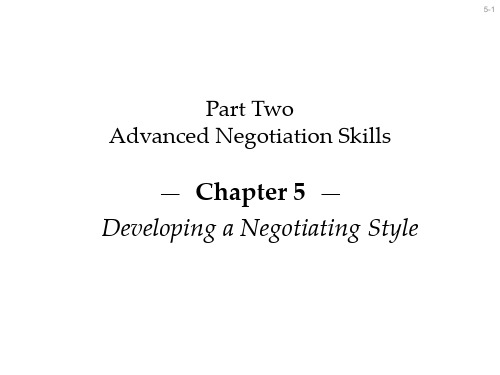
5-15
Interests, Rights, and Power Models of Disputing: PerPsoernsaolnSaltrsatrtaetgeigeises to refocus your opponent on
interests and away from rights and power (continued):
2. Develop your BATNA. 3. Get an agent and delegate the negotiation
work. 4. Bargain on behalf of someone or something
else, not yourself.
5-5
Motivational Orientation
principles in mind when choosing their approach:
• Principle of reciprocity • Interests are effective for pie expansion • How to refocus your opponent on interests
Interests, Rights, and Power Models of Disputing: StruStcrtuucrtaulraSltsrtarateteggiieess to refocus your opponent on
interests and away from rights and power include:
Rights-based negotiators:
• Apply standards of fairness to an analysis of the negotiation
- 1、下载文档前请自行甄别文档内容的完整性,平台不提供额外的编辑、内容补充、找答案等附加服务。
- 2、"仅部分预览"的文档,不可在线预览部分如存在完整性等问题,可反馈申请退款(可完整预览的文档不适用该条件!)。
- 3、如文档侵犯您的权益,请联系客服反馈,我们会尽快为您处理(人工客服工作时间:9:00-18:30)。
Halo Effects An individual generalizes about a variety of attributes based on the knowledge of one attribute of an individual
“He is smiling therefore he is also honest”
The Winners Curse
The tendency to settle quickly on an item and then subsequently feel discomfort about a win that comes too easily.
Overconfidence & The Law of Small Numbers Overconfidence
Communication in Negotiation
Distortions Senders and receivers
The more diverse their goals or the more antagonistic they are in their relationship, the greater the likelihood that Distortions and errors in communication will occur.
Selective Perception & Projection
Selective Perception
The perceiver singles out information that supports a prior belief but filters out contrary information The person who thinks “He is smiling therefore he is also honest” ignores behavior indicating the other party’s aggressiveness
Negotiators have a tendency to make systematic errors when they process information. These cognitive biases, impede negotiator performance; they include: – Irrational Escalation of Commitment – Mythical Fixed-Pie Beliefs – Anchoring and Adjustment – Winners Curse – Overconfidence – The Law of Small Numbers – Self-Serving Biases – Endowment Effect – Ignoring Other’s Cognitions
2. Transmitters and receptors
The choice of transmitter can affect outcomes. - Some messages may be better spoken, others written. - Poor eyesight, faulty hearing, etc. diminish the ability of a receiver to receive a message accurately.
4. Encoding
- The process by which messages are put into symbolic form - Senders are likely to encode messages in a form which receivers may not prefer
Projection
People ascribe to others the characteristics that they possess themselves “I am honest therefore she is honest also”
Cognitive Biases in Negotiation
Stereotyping An individual assigns attributes to another solely on the basis of the other’s membership in a particular social or demographic group
“Old people are conservative; this person is old and therefore is conservative”
Distortions in Communication
3. Messages
- The symbolic forms by which information is communicated - The more we use symbolic communication, the more likely the symbols may not accurately communicate the meaning we intend
Mythical Fixed-Pie Beliefs
Negotiators assume that all negotiations (not just some) involve a fixed pie.
Anchoring and Adjustment & Winners Curse Anchoring and Adjustment
Distortions in Communication
5. Channels
- The conduits by which messages are carried from one party to another. - Messages are subject to distortion from channel noise.
Distortions in Communication
7. Meanings
- The facts, ideas, feelings, reactions, or thoughts that exist within individuals and act as filters for interpreting the decoded messages . - Those filters can introduce distortions.
Irrational Escalation of Commitment & Mythical Fixed-Pie Beliefs
Irrational Escalation of Commitment
Negotiators maintain commitment to a course of action even when that commitment constitutes irrational behavior.
6. Decoding
- The process of translating messages from their symbolic form into a form that makes sense. - When people speak different languages, decoding involves higher degrees of error.
The Role of Perception
Perception: The process by which individuals connect to their environment -People interpret their environment in order to respond appropriately -The complexity of environments makes it impossible to process all of the information -As a result people develop shortcuts to process information -These shortcuts create perceptual errors
The effect of the standard (anchor) against which subsequent adjustments (gains or losses) are measured. The anchor might be based on faulty or incomplete information, thus be misleading.
Perception Distortion in Negotiation Four major perceptual errors:
1. Stereotyping 2. Halo effects 3. Selective perception 4. Projection
Stereotyping & Halo Effects
Endowment Effect
The tendency to overvalue something you own or believe you possess
Ignoring Other’s Cognitions
Ignoring Other’s Cognitions
Negotiators don’t bother to ask about the other party’s perceptions and thoughts. This leaves them to work with incomplete information, and thus produces faulty results.
